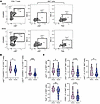Citation Information: J Clin Invest. 2025;135(15):e187992. https://doi.org/10.1172/JCI187992.
Abstract
We leveraged specimens from the RV217 prospective study that enrolled participants at high risk of HIV-1 acquisition to investigate how NK cells, conventional T cells, and unconventional T cells influence HIV-1 acquisition. We observed low levels of α4β7 expression on memory CD4+ T cells and invariant NK T (iNKT) cells, 2 cell types highly susceptible to HIV-1 infection, in highly exposed seronegative (HESN) compared with highly exposed seroconverter (HESC) participants. NK cells from HESN individuals had higher levels of α4β7 than did those from HESC individuals, presented a quiescent phenotype, and had a higher capacity to respond to opsonized target cells. We also measured translocated microbial products in plasma and found differences in phylum distribution between HESN and HESC participants that were associated with the immune phenotypes affecting the risk of HIV-1 acquisition. Finally, a logistic regression model combining features of NK cell activation, α4β7 expression on memory CD4+ T cells, and T-box expressed in T cells (Tbet) expression by iNKT cells achieved the highest accuracy in identifying HESN and HESC participants. This immune signature, consisting of increased α4β7 on cells susceptible to HIV infection combined with higher NK cell activation and lower gut-homing potential, could affect the efficacy of HIV-1 prevention strategies such as vaccines.
Authors
Kawthar Machmach, Kombo F. N’guessan, Rohit Farmer, Sucheta Godbole, Dohoon Kim, Lauren McCormick, Noemia S. Lima, Amy R. Henry, Farida Laboune, Isabella Swafford, Sydney K. Mika, Bonnie M. Slike, Jeffrey R. Currier, Leigh Anne Eller, Julie A. Ake, Sandhya Vasan, Merlin L. Robb, Shelly J. Krebs, Daniel C. Douek, Dominic Paquin-Proulx, for the RV217 Study Group
This file is in Adobe Acrobat (PDF) format. If you have not installed and configured the Adobe Acrobat Reader on your system.
Having trouble reading a PDF?
PDFs are designed to be printed out and read, but if you prefer to read them online, you may find it easier if you increase the view size to 125%.
Having trouble saving a PDF?
Many versions of the free Acrobat Reader do not allow Save. You must instead save the PDF from the JCI Online page you downloaded it from. PC users: Right-click on the Download link and choose the option that says something like "Save Link As...". Mac users should hold the mouse button down on the link to get these same options.
Having trouble printing a PDF?
- Try printing one page at a time or to a newer printer.
- Try saving the file to disk before printing rather than opening it "on the fly." This requires that you configure your browser to "Save" rather than "Launch Application" for the file type "application/pdf", and can usually be done in the "Helper Applications" options.
- Make sure you are using the latest version of Adobe's Acrobat Reader.
Supplemental data - Download (3.31 MB)



Copyright © 2025 American Society for Clinical Investigation
ISSN: 0021-9738 (print), 1558-8238 (online)

